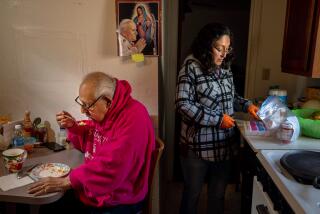More in U.S. caring for someone with health issues, study finds
- Share via
A rising share of Americans is caring for someone with health issues, often juggling the task with a job and family, the Pew Research Center found in a newly released survey.
Researchers found that 39% of U.S. adults surveyed said they were caring for an adult or child with significant health challenges in 2012, compared with 30% who said the same in 2010.
Experts say the numbers will continue to surge as the American population ages, putting added demands on workers and families. An earlier Pew study found nearly half of Americans surveyed said they would probably end up caring for an aging relative in the future.
Susannah Fox, an associate director at the Pew Research Center, said the economic downturn could also be pushing up the numbers, since fewer families can afford to pay someone for nursing or other care.
Increased diagnosis of conditions such as autism might also help explain the numbers, which have not only grown among those caring for adults but also among people caring for kids, Fox noted.
Medical strides may be another reason, since more people are surviving injuries or illnesses that once would have killed them, then coming home in need of continued care.
The change points to the need for more flexible workplaces and government support, said John Schall, chief executive of the Caregiver Action Network.
One example is expanding government programs providing “respite care” for a few hours so that caregivers can take a break, he said. Another idea is granting Social Security credits to people for time spent caring for someone in the home.
“People drastically underestimate the amount of physical work involved, the amount of time involved, and how it goes on and on and on,” said Meredith Gould, a Baltimore author who has helped other adults as both a paid and unpaid caregiver. “You can’t just drop in and out of caregiving.”
Pew found that caregivers turned to technology for help with the job. Among caregivers, 46% had sought help getting a diagnosis for a medical condition online, compared with 28% of adults who weren’t caregivers, the survey found. Close to 3 out of 4 caregivers said they had gathered health information online, compared with half of other adults.
The surging numbers made Fox wonder, “Who is going to help train this front-line army of healthcare workers?” she said. “The answer is here in our data. They’re training themselves.”
Trying to diagnose a health problem using the Internet sometimes worries physicians. Caregivers still turned to doctors, however, with 79% saying they sought a healthcare professional for information, care or support with a health issue. Their willingness to go online for extra help was seen as a good thing by many analysts and advocates. Nearly 6 out of 10 caregivers with Internet access said online resources had helped them provide care.
“They are desperately seeking answers to their questions, and they also like to talk to other caregivers,” said Susan Reinhard, a senior vice president at the AARP. “The more we can provide these places they can connect with each other, that’s helpful.”
The survey included more than 3,000 adults in the United States and was conducted in August and September of last year. It was supported by the nonprofit California HealthCare Foundation.
ALSO:
Auction sends wild horses to sanctuary -- or slaughter
Effort to protect California egg law in House farm bill fails
Jimmy Hoffa still missing after failed search at reputed burial site
More to Read
Sign up for Essential California
The most important California stories and recommendations in your inbox every morning.
You may occasionally receive promotional content from the Los Angeles Times.










